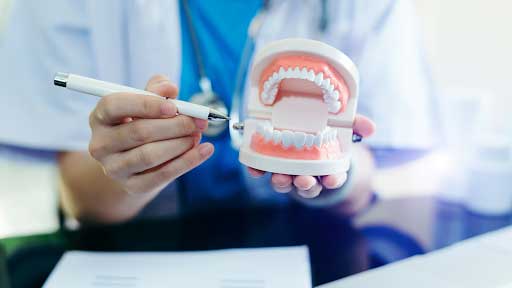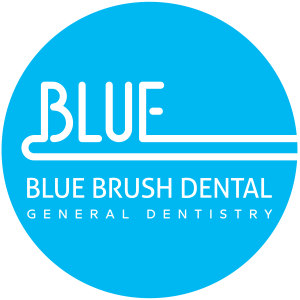Two options stand out as great choices when aiming to enhance your teeth’s appearance: dental implants and dentures. And it is a given situation as choosing between the two should take time and deep consideration. Both options offer an excellent procedure to improve your smile, bringing you confidence and unmatched beauty.
But the question remains – which of the two dental care options should you choose?
What Are Dental Implants?
Dental implants are often considered the gold standard for teeth replacement due to their durability, functionality, and aesthetic appeal. Dental implants are a modern solution for missing teeth, standing out for their durability and natural appearance. This process involves drilling a small hole into the jawbone, where the titanium post (the implant) is placed. Over time, the jawbone heals around this implant, securing it firmly in place through a process known as osseointegration. This direct anchoring also allows for a stronger bite and enables patients to eat a wider range of foods, improving nutritional intake and quality of life. Furthermore, implants do not require alteration to adjacent teeth, preserving more of the patient’s natural tooth structure. Their design and materials contribute to a high success rate, making them a preferred choice for long-term tooth replacement.
Unlike dentures or bridges, implants provide a permanent solution that closely mimics natural teeth in appearance and function. They are anchored directly into the jawbone, providing stability that helps preserve bone structure and prevent the bone loss commonly associated with missing teeth. The longevity of dental implants can vary, but with proper care, they can last a lifetime.
What are Dentures?
Dentures have long been a go-to for missing teeth, providing a removable option to replace many teeth or an entire dental arch. They come in two main types: complete dentures, used when all teeth are missing, and partial dentures, used when some natural teeth remain. Complete dentures rest on the gums, whereas partial dentures are supported by a metal framework that attaches to the natural teeth.
Unlike implants, dentures may need adjustment or replacement as the shape of the mouth changes. Additionally, dentures do not stimulate the jawbone, which can lead to bone loss over time, a problem implants help prevent by mimicking the root of a natural tooth and maintaining bone structure. Dentures could be a suitable alternative if you’re looking for a less invasive and more cost-effective solution or if your jawbone isn’t suitable for implants. They can be customized to match your remaining teeth and are relatively easy to adjust or replace.
Dental Implants vs Dentures: What Are Their Advantages?
The most effective way to make an informed decision between dental implants and dentures is by understanding what each option offers to the table. Let us look at the advantages and benefits of dental implants and dentures.
The Advantages of Dental Implants
Dental implant’s highlight lies in their long-term value and health benefits. Here are some of its key advantages:
- Longevity: Dental Implants are designed to last a lifetime with the proper care, making them a wise long-term investment.
- Bone Health: They integrate with your jaw, preventing bone loss and maintaining your facial structure.
- Functionality: Implants mimic natural teeth, allowing you to eat, speak, and smile without second thoughts.
- Aesthetics: Custom crowns ensure your implants blend seamlessly with your natural teeth, boosting confidence.
- No Dietary Restrictions: You can enjoy your favorite foods without hesitation with implants.
The Benefits of Dentures
On the other hand, dentistry offers significant benefits for those more inclined to non-surgical solutions. Below are some of its benefits:
- Non-Invasive: With no need for surgery, dentures are accessible to more people.
- Cost-Effective: They offer a more affordable upfront solution for tooth replacement.
- Quick Solution: You can receive dentures quickly, filling the gap in your smile in less time.
- Adaptability: Dentures can accommodate various dental conditions, offering flexibility.
- Aesthetic Improvement: Today’s dentures look natural, enhancing your smile and overall appearance.
With these insights, we’ve laid a solid foundation for understanding dental implants and dentures. Each has unique advantages, and choosing between them is deeply personal and dependent on individual needs and circumstances. Let’s continue to explore, keeping your specific situation in mind as we compare these options further.
Dentures vs Dental Implants: A Closer Look at the Downsides
While both dental care options provide solutions to your dental needs, there are also some downsides to both options you should consider. As usual, understanding them is essential for making the right choice.
Challenges with Dental Implants
While dental implants boast numerous benefits, they aren’t without their challenges:
- Surgical Procedure: Getting dental implants is invasive, requiring surgery. This might not be suitable for everyone, especially those with certain health conditions or fearing surgical procedures.
- Cost: Initially, dental implants are more expensive than dentures. The investment might be substantial, although it pays off in the long run due to its durability and minimal maintenance costs.
- Healing Time: After implant surgery, a significant healing period is required for osseointegration, where the implant fuses with the jawbone. This process can take several months, during which patients may need to follow dietary restrictions and attend follow-up visits.
- Risk of Failure: Although rare, there’s a risk of implant failure, particularly in smokers or patients with underlying health issues that impair healing. Proper screening and post-operative care are crucial to mitigate these risks.
Limitations of Dentures
Dentures offer a non-surgical and cost-effective solution but come with their own set of limitations:
- Fit and Comfort: Over time, the fit of dentures can change due to natural alterations in the mouth’s shape. This can lead to discomfort and the need for adjustments or new dentures.
- Maintenance: Dentures require daily removal and cleaning to maintain oral hygiene and prevent infections. This routine might be cumbersome for some individuals.
- Eating and Speaking Challenges: Adapting to dentures can take time. Wearers might find it difficult to eat certain foods or speak clearly without the dentures shifting.
- Bone Loss: Unlike dental implants, dentures do not stimulate the jawbone, which can lead to bone loss over time, altering the facial structure and fit of the dentures.
Considering these critical disadvantages is crucial, especially if you’re still confused about which option to choose. You must ensure you weigh in your options by juggling the negative and positive sides we’ve provided.
Dental Implants vs Dentures Cost
Now, let’s talk numbers. The battle between dental implants and dentures isn’t just about smiles; it’s also about cost. Understanding the financial side can help you choose the one that suits your budget and dental needs.
Dental Implants: The Durable Option
As mentioned before, dental implants are like the gold standard for tooth replacement – durable, natural-looking, and considered a long-term investment. However, this quality comes with an initial cost.
- Upfront Investment: Implants might have a higher initial price.
- Long-Term Value: With proper care, implants last for the long haul – minimal maintenance and lasting smiles.
- Insurance Check: Check if your dental insurance helps with some of those implant costs.
Dentures: The Classic Choice
Dentures, the OGs of tooth replacement, offer a removable and budget-friendly option. But, like any classic, they have their considerations.
- Budget-Friendly Start: Dentures are wallet-friendly upfront.
- Ongoing Costs: They might need adjustments and maintenance down the road.
- Insurance Inquiry: It’s wise to check if dental insurance helps with denture expenses.
Considering all the factors for both options will allow you to make an informed decision as to what choice best fits your needs and preferences.
Which Is Right For Me? Making the Comparison
Now that you know both dental solutions’ pros and cons, it’s time to compare them based on their aesthetic and functional outcomes, durability, maintenance, and impact on oral health.
Aesthetic and Functional Outcomes
Dental implants are renowned for closely mimicking the appearance and functionality of natural teeth. Once the healing process is complete, they allow individuals to enjoy a varied diet without restrictions and do not affect speech clarity. Dental implants’ design and anchoring method ensures a natural look and feel, significantly enhancing the smile and overall facial aesthetics.
On the other hand, modern denture implants offer a more natural appearance than in the past and have improved design and materials. However, they are removable and rest on the gums, so they might not provide the same functionality and comfort as implants. Options like permanent dentures and partial dentures have made strides in offering better stability and aesthetics, but they still differ from dental implants’ fixed, seamless nature.
The Question of Durability and Maintenance
The longevity of dental implants and all on 4 dental implants is one of their most significant benefits. They are designed to last a lifetime with the proper care, requiring minimal maintenance aside from regular dental hygiene practices.
Dentures, while helpful, do not offer the same permanence as implants. They are, however, more accessible to repair or replace if damaged. The maintenance of permanent dentures, even partial ones, involves daily cleaning and occasional adjustments to ensure a comfortable and secure fit, which may be cumbersome for some individuals.
Considerations for Oral Health
Full mouth dental implants positively impact oral health by preventing bone loss and maintaining the alignment of surrounding teeth, much like natural tooth roots. This support promotes overall jaw health and prevents the changes in facial structure associated with tooth loss.
In contrast, denture implants can restore missing teeth’ appearance and primary function but cannot stimulate the jawbone, potentially leading to bone deterioration over time. This lack of stimulation can affect both oral health and the fit of the dentures, highlighting the importance of considering long-term oral health effects when choosing between dental implants and dentures.

Factors to Consider in Your Choice
When deciding between dental implants and dentures, consider your overall health, budget, and lifestyle:
Health and Age: Your general health and age might influence whether dental implants or dentures suit you. Dental implants require surgery and healing, making them a better fit for individuals in good health. Meanwhile, dentures offer a non-invasive alternative that might be preferable for those with certain health conditions or concerns about surgery.
Budget: Initial and long-term costs vary significantly between dental implants and dentures. Dental implants represent a higher upfront investment but are more cost-effective over time due to their durability. Dentures, while less expensive initially, may incur additional costs for maintenance and replacement.
Lifestyle Preferences: Your daily activities and personal preferences play a crucial role. If you lead an active lifestyle or prefer a hassle-free solution, dental implants might be more appealing due to their stability and low maintenance. Dentures can offer a practical solution with proper care but may require adjustments and more daily maintenance.
It is also worth noting that exploring the latest dental technology, including all on 4 dental implants and full mouth dental implants, can provide a clearer picture of what each option entails.
Consulting with Dental Professionals: Choosing the Right Clinic
Choosing between dental implants and dentures is significant and can be confusing. Thus, the call for partnering with the right dental clinic is crucial. At Blue Brush Dental, we pride ourselves on our experienced professionals, successful track record, and commitment to addressing all patient questions and concerns.
Understanding your dental health is vital to your overall well-being, so we focus on providing personalized care that aligns with each patient’s unique needs and goals. Selecting Blue Brush Dental ensures a supportive and informed pathway toward improving your dental health and quality of life.


